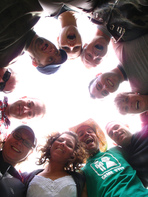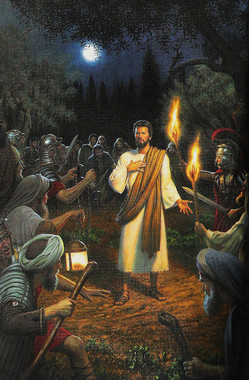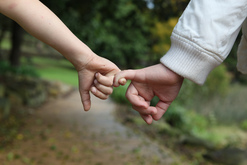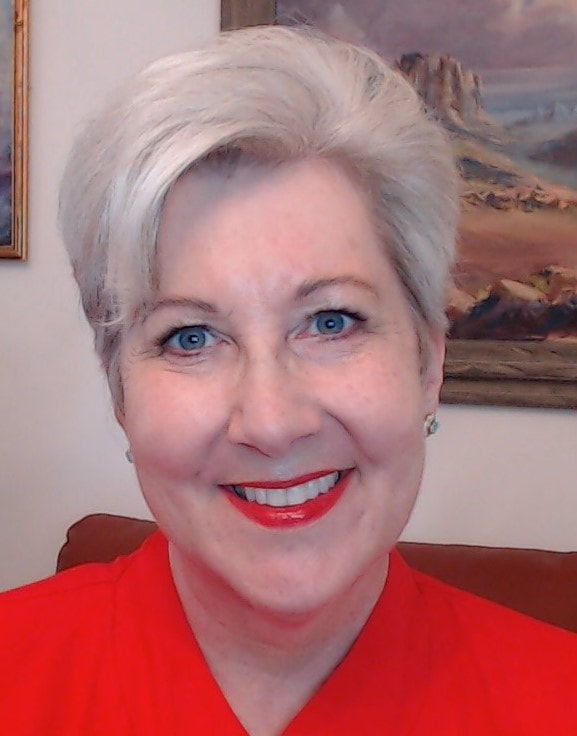|
3/26/2013 Unbroken Friendship In the Bible, a proverb counsels, “A man that hath friends must shew himself friendly.” (Proverbs 18:24) This I love to do. I love all my friends. I love to support, care, and show them they are special to me. I have always had good friends – not just friends, but best friends - those who don’t cling; who are secure in the knowledge that they are loved even if long periods of time pass between contact; those who live their lives and let me live mine; those who come and go over the years, leaving a sweet trail of encouragement, support and kindness in their wake. With all this rich friendship in my life, I hadn’t given much thought to what it would be like to be friendless. But when a close friend “broke up” with me, I felt isolated and alone. It wasn’t that I didn’t have other friends. I was simply confused as to why I couldn’t have that one in my life. I had had breakups before, but none that rocked me like this one. For several months after, I avoided even thinking about my friend, not wanting to hear in my mind those stomach-socking words, “I don’t want to have any more contact with you.” Although her reasons made no sense to me, I respected her directness. I had to let her go. And I learned a few lessons about friendship along the way.  Mary Baker Eddy asked in her textbook on Christian Science, “Would existence without personal friends be to you a blank? Then the time will come when you will be solitary, left without sympathy; but this seeming vacuum is already filled with divine Love. When this hour of development comes, even if you cling to a sense of personal joys, spiritual Love will force you to accept what best promotes your growth.” Further on, she wrote, “Universal Love is the divine way in Christian Science.” (Science and Health with Key to the Scriptures, p.266) My lessons on friendship came from prayer about Love, from prayer centered on getting to know the universal Love that is God as my best and ever Friend. The first chapter of Science and Health, titled Prayer, emphasizes God’s nature as Love – not simply as having a loving aspect, but as Love, divine Love itself – the impartial, always available Love that never puts conditions on His expression of love - “I’ll love you this much if…” Or, “I’ll be your Friend when…” Love loves like the sun shines. No one is left out of the Love-light. Divine Love is not conditional or arbitrary. It is universal, unlimited and freely given. Love can do nothing but express love to everyone, everywhere. Love is all, and we all live in God’s love. Divine Love never quits, never changes, never stops. God is the everpresent Friend that never abandons His creation. As I got to know God as my Friend, I saw that I could trust this Friend to never drop me. In this enormous sense of Love’s friendship, I saw God as my constant Companion and my most faithful Friend.
 Love loves. Love’s friendship blesses in all circumstances no matter what. No one is left out. Nothing is left behind. Our divine Friend is always present no matter where we may find ourselves. Our connection to this Friend, our security in the divine friendship, is not dependent on another person. Knowing God to be Friend helped me lift up my expectations in my human friendships to look for, in myself and in those around me, the permanence, fidelity and other spiritual qualities inherent in God’s creation as His image and likeness. In her autobiography, Mary Baker Eddy once wrote, “There are no greater miracles known to earth than perfection and an unbroken friendship. We love our friends, but ofttimes we lose them in proportion to our affection.“ (Retrospection and Introspection, p. 80) Jesus called Judas “friend” even after knowing that he betrayed him. Jesus knew his true and perfect Friend to be God, and could only see God’s likeness in those he loved. Jesus always loved Judas. While Judas' behavior may have separated him from Jesus, it was a onesided break-up. Even betrayal couldn’t separate Jesus from his friend.  In the case of my friend, I had gone quiet for a period before the break up, slipping away during a tumultuous period of my life. My intention was to protect her from worrying about me, but it was misunderstood and seen as neglect. I am deeply sorry about that misunderstanding, but I would not have handled it differently. I did what I did out of love for my friend, to the best of my understanding at that time. And I cherish the lessons I have since learned about friendship. I now know that it can only be broken if I allow it to be. And I don’t. I will always love her as my friend. No child of God can truly unfriend another. Friendship is an expression of Life as much as an expression of Love. It is not optional. If it should occur that we disconnect and go our separate ways, we are all still linked eternally in life and love by divine Love. And only in love. Not in pain, dishonesty, hate, sadness or fear. I think a line from Shakespeare’s Sonnet No. 30 sums up perfectly what a spiritual perspective can bring to our friendships: “But if the while I think on thee, dear friend, All losses are restored, and sorrows end.” My anguish over that relationship stopped as I realized that nothing has the power to deprive me of true friendship, a divine attribute that God expresses constantly in my life. Since no one can be Godless, no one can be friendless. Now when I think of that friend, instead of pain and loss, I feel love. And loved. We are both loved, moving forward and progressing in Love. No one is left out or put out of Love's circle of friends. No one.
To be sure you don't miss something,
you can have new posts delivered to your email inbox. Simply subscribe in the sidebar. And if this post is meaningful to you, it may also help others. Please share! You may also wish to: VISIT MY WEBSITE HOME PAGE FIND LINKS TO MY OTHER PUBLISHED CONTENT LISTEN TO A COLLECTION OF MY "YOUR DAILY LIFT" 2-MINUTE PODCASTS 4/10/2012 Resurrecting the heart after a betrayal Nothing touches my heart in the Easter story like the disappointment and betrayal of Jesus by his closest friends. First, the disciples slept through their prayer watch in the garden of Gethsemane. Then Judas, whom Jesus loved, betrayed him to the Roman soldiers. And finally Peter and others abandoned him to spend those lonely, difficult hours on the cross without their support. I have found that, of the range of human difficulties, acts of betrayal can be particularly challenging to move beyond. Although insignificant in light of what Jesus suffered, many years passed before I stopped sucking in the halting breath of a sucker punch and stopped feeling an aching tightness mid-chest when I thought of a high school sweetheart whom I had discovered to be cheating on me with one of my best friends. Finding a way past the pain of betrayal often involves forgiveness. And forgiveness sometimes requires stepping out of well-worn thought paths and choosing to see others in a better light. That was certainly the case for me. In fact, it was Jesus' story that some years later helped me resurrect my heart from the dark, dank tomb of betrayal. The Bible Lesson I studied the week before Easter one year focused heavily on Judas' betrayal and Jesus' turning to God to forgive. "Father, forgive them, for they know not what they do," were the healing words Jesus spoke from the cross on behalf of all his persecutors. It seemed so natural for such a Godlike man to make God's forgiveness of others his first line of attack in combating sin and pain. Forgiveness was a part of his makeup, a holy expression of the Christ. For him, it was the most natural thing.  But as I read the story, I felt overwhelmed, sunk under anger for what Judas had done. How could he so abuse Jesus' love? How could I ever forgive Judas? Anger stirred up all kinds of ugly feelings of the betrayal of trust, innocence and love. During that week before Easter, my thoughts became darker and darker with unhealed anger. I understood that the real message of Easter is not to be confined to the suffering of crucifixion, but it involves the resurrection to a renewed life and the ascension above the effects of sin, sorrow, pain and death. I longed to honor Jesus by my own resurrection from anger to forgiveness. So I prayed for a change of heart. I prayed to know how to love Judas and to forgive him. My prayers took me back to the Bible. The book of Lamentations covers the period of sharp, intense pain, anger and sadness immediately after the fall of Jerusalem. The shock over the event gradually fades into the chronic ache of captivity. I think the Jewish people's reaction to their world being turned upside-down are the same emotions that follow a betrayal. Jeremiah wrote,"My strength and my hope is perished from the Lord. Remembering mine affliction and my misery, the wormwood and the gall. My soul hath them still in remembrance, and is humbled in me." (Lamentations 3:18-20) Yet even while laying bare this raw and anguished mental state, the prophet also offers a ray of hope. He lights a way out of perpetual suffering when he continues, "This I recall to my mind, therefore have I hope. It is of the Lord's mercies that we are not consumed, because his compassions fail not. They are new every morning: great is thy faithfulness... Let us lift up our heart with our hands unto God in the heavens." (ibid. 3:21-13,41)  "It is of the Lord's mercies that we are not consumed." I realized that I didn't have to love Judas the betrayer. That is, I didn't have to stay within the frame of reference of Judas as a betrayer. But I could love the Judas that was not consumed by betrayal and hate - the Judas that God's mercies knew and loved and renewed every morning. I could exchange my sense of Judas the betrayer for the Judas that was resurrected from envy, hate, greed, remorse, guilt, and self-destruction, to repentance and progress, through the forgiveness, grace and ever-renewing mercies of the Christ, Truth. I could love the Judas who had progressed on under the renewable mercies of divine Love, which morning after morning pours forgiveness and love on His children. I thought, "Why, the real Judas has probably ascended by now under the influence and healing power of all that compassion and mercy and love. He would no longer identify himself with the evil that claimed to possess him. Am I going to still hold him, centuries later, to his worst behavior on his most deluded day?" Jesus didn't. "Father, forgive them," included Judas, too. It seems to me that Jesus' method of forgiveness, being counter-intuitive to the human mortal response to betrayal, acted like ammonia mixed with chlorine in a closed room. It deprived evil of all air, literally snuffing it out. I felt a cool, spiritual breeze blow through my thoughts, cleaning out old memories that had clung to me like dried, dead leaves hang on a tree until the March winds shake them off.  I thought of my friends. It occurred to me that that had my boyfriend known who he was as God's good child - how good I knew him to be; had my girlfriend understood how I loved her - how much I valued our friendship; they both would have, at the very least, dealt with me directly first, before proceeding with their relationship. I felt compassion for them. They hadn't known who they were. They didn't know what they did. That was all that I needed to forgive the worst and let go of the pain of the betrayal. I don't claim to begin to the fathom the depth of the betrayal, and the great heights of the divine Love, that Jesus experienced. But I do know that every part of his story teaches us something essential about the marvelous capacity and resilience we have, as God's children, to forgive and to grow in love. Mary Baker Eddy wrote, "Christianity is not superfluous. Its redemptive power is seen in sore trials, self-denials, and crucifixions of the flesh. But these come to the rescue of mortals, to admonish them, and plant the feet steadfastly in Christ. As we rise above the seeming mists of sense, we behold more clearly that all the heart's homage belongs to God. More love is the great need of mankind. A pure affection, concentric, forgetting self, forgiving wrongs and forestalling them, should swell the lyre of human love." Miscellaneous Writings, 106 Conversation and comments are encouraged. Please jump in!
If you like what you see, share the link with your friends, fans and followers! A full-text version of this blog can be delivered to your email inbox. Please subscribe in the sidebar. You may also wish to: VISIT MY WEBSITE HOME PAGE READ MORE BLOG POSTINGS FIND A LIST OF MY OTHER PUBLISHED CONTENT 11/2/2011 Aflame with divine Love Passion. Whether it is for a special person, a valued project or a life goal – who doesn’t adore that feeling of heightened purpose and breathless, eager anticipation that we call passion? I am not talking about a mere physical reaction or emotional bond. Passion, in its spiritual sense, is the fire of inspiration and pure love for its subject. Many go to great lengths to capture true passion. When they find it, they hope to sustain it as long as possible. But when the initial fire of one's passion seems to fade into embers, does this mean that the love and inspiration is coming to an end? Is there something we can do to fan the flame and rekindle the ardor of inspired commitment to that special something or someone we love? The Bible offers some insight into what happens in long relationships or steady unchanging career paths when habitual patterns of thinking and acting sometimes take over. Duty replaces joyful activity, spontaneous acts of attention begin to suffocate under the daily grind, and what we once fiercely loved can become a trial of our patience and an endurance test. 10/30/2011 Looking for your Soul-mate? Good news! This post is now been published on CSMonitor.com. You can go to the link to read it on their site. But I will keep the links to the articles that take you deeper into the subject available here. Soul-mate. worthy of my love, contact, a gift to each other |

Find me on YouTube
I have practiced Christian Science professionally in some form since 1979. But my journey with Christian Science started in a Sunday school where as a young child I was taught the Scriptures and some simple basics of Jesus' method of scientific Christian healing. A significant experience at the age of twelve opened my eyes to the great potential of this practice. After impaling my foot on a nail, I prayed the way I had learned in Sunday school. Within moments the pain stopped and healing began. By the next morning the wound had disappeared completely. Having experienced the great potential of Christian Science, there would be no turning back. |
INFORMATION |
SERVICES |
HELP |
© 2011-2024 Michelle Boccanfuso Nanouche, CSB. All rights reserved. Pages updated July 1, 2024.

 RSS Feed
RSS Feed
